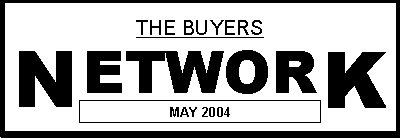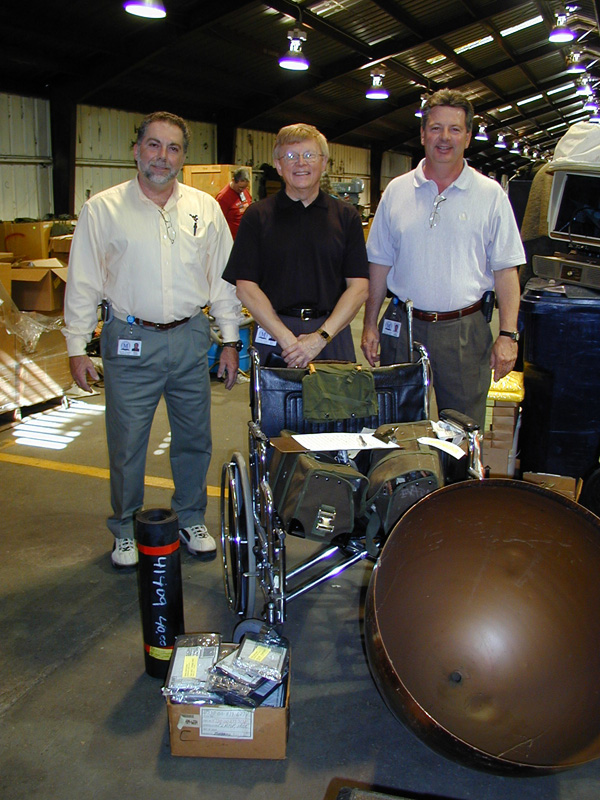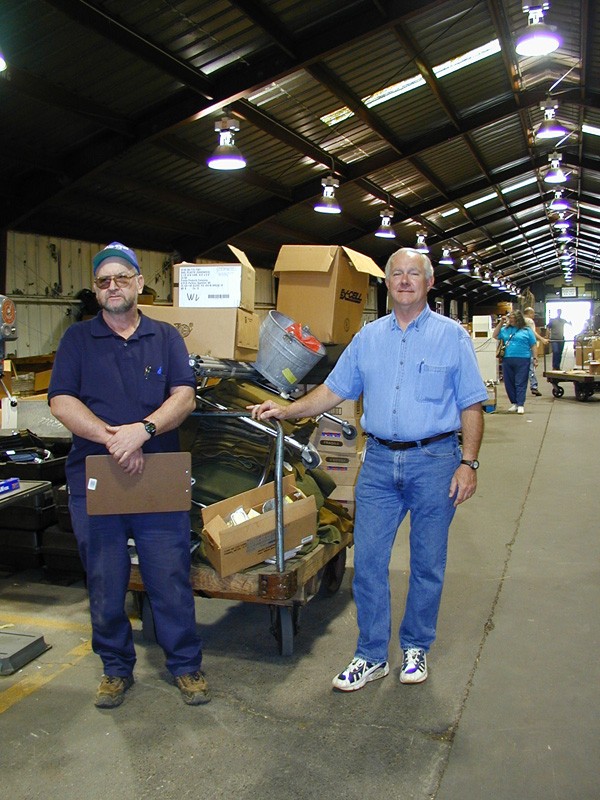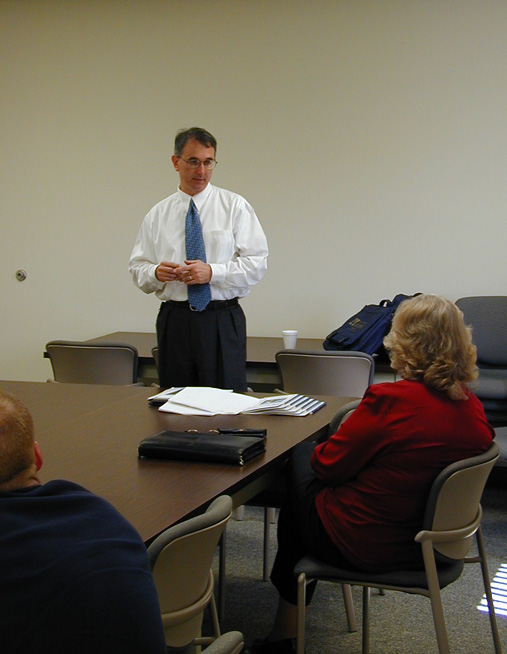

The Buyers Network is Published Monthly by
the Purchasing Division of the West
Virginia Department of Administration to Promote Better Value in Public Purchasing
Welcome to the May 2004 Issue of the The Buyers Network!
Articles in this Issue:
Preparing for the Federal
Inventory Process
Surplus Property Provides Discounts to Prepare for Annual Federal Inventory
Director's Comments:
Budgetary Constraints at End of Fiscal Year
BusinessFirst Seminar Series Targets Small Businesses in West Virginia
As Year-End Approaches
Purchasing Timelines Established for Agencies
Senate Bill 100 Strengthens the Impact of Debts Owed to the State of WV
Mandatory Fixed Assets Training Successful
What's State Government Buying?
MONEYWISE...Tips for the Thrifty
Time-Saving Tips to Get More Done
The Travel Bag...News and Tips from the State Travel Management Office
Current Statewide Contract Update
 Once a year, the Surplus Property Unit
organizes a way to repay its customers by offering some eye-raising discounts on
federal surplus property. For three days in April, federal property was discounted 50
percent off for eligible customers as part of a Pre-Inventory Federal Reduction Sale, in
preparation of its annual federal inventory that is required by the U.S. General Services
Administration.
Once a year, the Surplus Property Unit
organizes a way to repay its customers by offering some eye-raising discounts on
federal surplus property. For three days in April, federal property was discounted 50
percent off for eligible customers as part of a Pre-Inventory Federal Reduction Sale, in
preparation of its annual federal inventory that is required by the U.S. General Services
Administration.
 "In order to get ready for it,"
said Surplus Property Manager Ken Frye, "we had to clean up the facility and make
sure all of the tags were properly displayed so our customers could see the property well
and be able to find what they needed quickly."
"In order to get ready for it,"
said Surplus Property Manager Ken Frye, "we had to clean up the facility and make
sure all of the tags were properly displayed so our customers could see the property well
and be able to find what they needed quickly."
The sale offered a range of items from ammunition cans to tool kits, from shop equipment to vehicles. "We think the customers received a big benefit from this sale and I hope they continue to come back," Frye said.
The benefits realized were not solely from the customers, who drove out with truck loads of bargains. The Surplus Property Unit also benefited from this sale because the items which were sold during the sale did not need to be inventoried ... a process which is extremely time consuming when you consider the thousands of items which are stored in the federal surplus property warehouse.
Tim Lowry, a supervisor for Cedar Lakes, purchased a Dodge van and
other items for their dining hall. The van will be used to transport guests to and
from the airport from Cedar Lakes. "We've been coming to Surplus Property for nearly
13 years and have had very good luck at these sales. We've bought good equipment for our
facility," Lowry said.
will be used to transport guests to and
from the airport from Cedar Lakes. "We've been coming to Surplus Property for nearly
13 years and have had very good luck at these sales. We've bought good equipment for our
facility," Lowry said.
 Representatives of the Mineral County Board
of Education also benefited from the Pre-Inventory Reduction Sale. Assistant
Superintendent Steve Peer brought two employees with him to demonstrate the values that
can be realized. "We have been coming to Surplus Property for the past 25 years. We
enjoy looking around during our visits...sometimes we find something, other times we
don't. But the best thing is the prices!," Peer said.
Representatives of the Mineral County Board
of Education also benefited from the Pre-Inventory Reduction Sale. Assistant
Superintendent Steve Peer brought two employees with him to demonstrate the values that
can be realized. "We have been coming to Surplus Property for the past 25 years. We
enjoy looking around during our visits...sometimes we find something, other times we
don't. But the best thing is the prices!," Peer said.
Mayor Lewis Full of the Town of Elizabeth is now an avid fan of the Surplus Property Program. "We came down and hit a good deal...a REAL good deal," he said. "We brought two pickups and can't get another thing on them. We've got all we can haul. This is our first trip, but we'll definitely be back."
The Surplus Property employees spent the week of April 26 performing the federal inventory of property. During this time, the federal surplus property warehouse was closed in order to expedite this task.
For additional information on federal surplus property or its availability, contact Federal Warehouse Supervisor Danny Layton at 766-2626.
 Budgetary constraints are a concern to all entities, public and private. Often the end of fiscal year is when our state
agencies find it most difficult to acquire needed items with limited funds remaining.
Budgetary constraints are a concern to all entities, public and private. Often the end of fiscal year is when our state
agencies find it most difficult to acquire needed items with limited funds remaining.
However, there are many ways the dollar can be stretched to enhance your operation, while abiding by established purchasing policies and procedures.
In some cases, quantities within a spending unit may be combined, offering lower costs for quantity purchases. Even though combining quantities may result in the need to solicit written or verbal competition, it may reduce the overall costs to your agency.
Establishing competitively bid term contracts for small dollar repetitive type service requirements is yet another idea, even when the total annual expenditure may not exceed $5,000.
Be creative in ways to reduce spending within your agency or to find alternative ways to meet the needs of your agency using limited tax dollars.
And, more importantly, be cautious when utilizing state funds throughout the year. By doing so, this mindset will alleviate any potential funding situations that may occur at the end of the fiscal year.
Back to the Top BusinessFirst Seminar Series Targets Small Businesses in West Virginia Acting Cabinet Secretary
of Administration Tom Susman and Purchasing Director Dave Tincher were pleased to
implement a new program, called BusinessFirst, which was offered during the month
of April in an attempt to attract and inform small businesses on how to do business with
state government.
Acting Cabinet Secretary
of Administration Tom Susman and Purchasing Director Dave Tincher were pleased to
implement a new program, called BusinessFirst, which was offered during the month
of April in an attempt to attract and inform small businesses on how to do business with
state government.
Administered through the New Business Development Office of the Purchasing Division, this seminar series was presented in 15 cities throughout the state. The half-day seminars consisted of two individual workshops: "Opportunities" and "Mechanics".
The "Opportunities" portion explained why businesses should target the state of West Virginia as a potential customer. The "Mechanics" segment reviewed the steps on how to conduct business with state government, including explicit steps on becoming a registered vendor and the procedures necessary to participate in the competitive purchasing process.
The purpose of the BusinessFirst Seminar Series was to bring the business assistance resources about why and how to conduct business with state government directly to the business community. The workshops emphasized the state’s various needs for goods and services which may be provided by small West Virginia businesses.
The cities in which the seminars were included in the BusinessFirst series were Beckley, Clarksburg, Elkins, Fairmont, Lewisburg, Logan, Martinsburg, New Martinsville, Ripley, Terra Alta, Weirton, Wheeling and Williamson. The seminars were standardized so the same information was disseminated to all participants throughout the state.
For additional information on our new business development efforts, please contact Scott Padon, New Business Development Manager, at (304) 558-3488 or via email at: spadon@wvadmin.gov.
As Year-End ApproachesTo facilitate a smooth transition for encumbrance document processing between fiscal year 2004 and 2005, the Department of Administration, in conjunction with the State Auditor's Office, has formulated the following plan for the fiscal year-end processing of Encumbrance documents on the West Virginia Financial Information Management System (WVFIMS).
The primary objectives for year- end processing are to prevent a backlog of transactions in the Purchasing Division and the State Auditor's Office and to ensure the timely processing of agency transactions. The key to accomplishing this goal is the cooperation of each agency in adhering to the year-end processing plan.
Agencies are recommended to process encumbrance documents as usual for non-appropriated and reappropriated accounts through June 11, 2004. However, priority should be given to those transactions that are non-appropriated and should be processed by June 30, 2004.
To assist the Purchasing Division and the State Auditor's Office in processing expiring fund encumbrance transactions, please distinguish these transactions by using an expiring funds stamp with red ink on the face of the document beginning Monday, May 3, 2004.
The following is an abbreviated version of the Purchasing Division timeline. For complete instructions on year-end processing as it relates to purchasing documents, please visit the Purchasing Division's Intranet site at http://intranet.state.wv.us/admin/purchase.
EXPIRING ACCOUNTS
Appropriated General/Special/Federal Revenue
May 3: Last day requisitions (WV-35’s) for bid referencing expiring funds may be submitted to the Purchasing Division.
June 11: Last day that non-bid requisitions, (e.g. change orders, direct purchase orders, emergency purchase orders, and/or equipment contract orders) referencing expiring funds may be submitted to the Purchasing Division for processing.
June 11: First day fiscal year 2005 Encumbrance documents may be entered into WVFIMS.
July 1: First day the Purchasing Division may be able to encumber and electronically approve fiscal year 2005 encumbrance documents to the State Auditor's Office.
NON-EXPIRING ACCOUNTS
Non-appropriated Special Revenue; Re-appropriated Accounts
June 11: Last day to submit fiscal year 2004 Encumbrance (purchase order) documents to Purchasing for Non-appropriated Special Revenue and/or Re-appropriated Special Revenue accounts. Any document not processed in fiscal year 2004 will be processed in fiscal year 2005.
June 18: All encumbrance transactions (WVFIMS Purchase Orders and Purchase Order Adjustments) that were unable to be processed by the Purchasing Division by this date will be rejected to the agency of origin.
July 1: Agencies may modify any encumbrance document that was rejected to their agency due to year- end processing to reflect the correct fiscal year on the split screen. Agencies may also begin approving fiscal year 2005 transactions. This is dependent upon approved expenditure schedules being filed with the State Budget Office.
GENERAL TIME LINE
July 1: Agencies may modify any Encumbrance document that was rejected to their agency due to year- end processing to reflect the correct fiscal year on the split screen. Agencies may also begin approving fiscal year 2005 transactions. This is dependent upon approved expenditure schedules being filed with the State Budget Office.
PROCUREMENTS WITH START DATES OF JULY 1, 2004
Any encumbrance document (Purchase Order) processed containing a start date of July 1, 2004 clause will be held by the Purchasing Division until the funds associated with the contract can be encumbered on WVFIMS for fiscal year 2005. The scheduled date for encumbrance of these funds is July 1, 2004.
PROCESSING REJECTED TRANSACTIONS
For non-appropriated and reappropriated accounts, on June 30, 2004, all transactions with fiscal year 2004 on the split screen that have not been completed by the Auditor's Office will be automatically rejected on WVFIMS and the documents will be returned to the agency of origin.
Back to the Top Senate Bill 100 Strengthens the Impact of Debts Owed to the State of WVAs a result of the passage of Senate Bill 100, the Purchasing Division has revised the No-Debt Affidavit, which is required of all state agencies. This legislation resulted a change in the West Virginia Code, §5A-3-10a, effective June 11, 2004, to this affidavit which is used in the state purchasing process.
A statewide memorandum will be issued later this month to all agency procurement officers with the revised form attached.
According to this legislation, no contract or renewal of any contract may be awarded by the state or any of its political subdivisions to any vendor or prospective vendor when the vendor or perspective vendor or a related party to the vendor or prospective vendor is a debtor and the debt owed is an amount greater than one thousand dollars in the aggregate.
One change in the No-Debt Affidavit is the prohibition against awarding contracts to vendors which owe a debt not only to the state, but to its political subdivisions. According to this law, a political subdivision means any county commission; municipality; county board of education; any instrumentality established by a county or municipality; any separate corporation or instrumentality established by one or more counties or municipalities, as permitted by law; or any public body charged by law with the performance of a government function or whose jurisdiction is coextensive with one or more counties or municipalities.
A major change to the affidavit relates to the dollar threshold of debts owed. As stated, no contract or renewal of any contract may be awarded by the state or any of its political subdivisions to any vendor or prospective vendor when the vendor or prospective vendor or related party to the vendor or prospective vendor is a debtor and the debt owed is an amount greater than $1,000 in the aggregate.
According to the Code, "debt" means any assessment, premium, penalty, fine, tax or other amount of money owed to the state or any of its political subdivisions because of a judgment, fine, permit violation, license assessment, defaulted workers’ compensation premium, penalty or other assessment presently delinquent or due and required to be paid to the state or any of its political subdivisions, including any interest or additional penalties accrued thereon.
"Debtor" refers to any individual, corporation, partnership, association, limited liability company or any other form or business associational owing a debt to the state or any of its political subdivisions.
The prohibition of this section does not apply where a vendor has contested any tax administered pursuant to chapter eleven of this code, workers’ compensation premium, permit fee or environmental fee or assessment and the matter has not become final or where the vendor has entered into a payment plan or agreement and the vendor is not in default of any of the provisions of such plan or agreement.
As of the June 11, 2004 effective date, the revised No-Debt Affidavit will be accessible on the Purchasing Division's website at www.state.wv.us/admin/purchase.
Back to the Top NUTS & BOLTSBack to the Top
The Purchasing Division has begun using a new Internet e-mail domain name: wvadmin.gov. E-mail sent to gwmail. state.wv.us after June 13, 2004, will be returned to the sender as "undeliverable." Currently, both addresses are valid. For example, John Doe can receive mail sent to either: jdoe@gwmail.state.wv.us or jdoe@ wvadmin.gov. The "reply to" address will be jdoe@ wvadmin.gov. Please make note of this change when e-mailing the employees of the Purchasing Division.
More than 100 agency coordinators attended a mandatory training session during the month of March on fixed assets procedures, including the disposition of property and electronic entering of data.
The Purchasing Division appreciates the attendance and encourages the coordinators to refer to the literature distributed in performing their agency's inventory responsibilities.
Back to the Top What's the State Buying? (This information is compiled from the West Virginia Purchasing Bulletin. The purpose is to provide an awareness of the variety of products and services being procured in state government. Only a small sample of solicitations are listed.)
- All State Agencies
A request to provide long distance services to all state agencies as part of a statewide contract.
- Division of Forestry
A request to supply firefighting equipment and clothing.
- All State Agencies
A request to provide personal computers and peripherals to all state agencies as part of a statewide contract.
- Department of Administration
A request to provide an energy savings program for all buildings in the State Capitol Complex.
- Division of Engineering and Facilities
A request to supply and apply herbicides for use on approximately 211 acres at Camp Dawson Army Training Site in Kingwood, WV.
- Division of Culture and History
A request to complete restoration on three oil paintings.
Back to the Top
Time-Saving Tips to Get More
Done
Do you want to get out from under those piles of paper, so your office looks professional instead of like a disaster zone? Here are some useful tips that should help you get started on the way to getting more done each day and relieving some of that stress.
1. From time to time, ask yourself whether what you are doing is urgent or important. If not, move on.
2. Use your time for activities requiring your specific skills and delegate other tasks to other staff members.
3. A master list reminds you of everything that must be done. Select from this list for your daily "to do" list.
4. Create a page in your organizer for frequently called numbers and have an e-mail address book.
5. Use a specific color to highlight, on your calendar, those times you will be working or traveling away from the office.
7. Use colored labels on file folders. You will locate files up to 50% faster.
8. Give each project its own file folder.
9. Carry a folder of reading material with you for those downtimes.
10. Take 15 minutes at the end of each day to clear your desk and prepare a "to do" list for tomorrow.
11. Learn to say no to activities that divert you from reaching your goals.
12. Avoid procrastination at all costs.
13. Identify when you work at peak performance. Schedule at this time each day to tackle your most challenging and productive work.
14. Work uninterrupted during quiet time for maximum productivity. Let phone calls go to voice mail.
15. Focus on one task at a time and give it your undivided attention.
16. Set a specific time to do recurring, routine paperwork.
17. Schedule blocks of time in the morning and the afternoon to make phone calls.
18. Reply to faxes and e-mail all at one time rather than individually.
19. Make computer templates of all documents you create regularly.
20. Label computer disks and CD’s so you don’t have to load each one to find out what is on it. Always color code.
Source: NIGP; excerpt reprinted by permission of Carol Halsey, Business Organizing Solutions. For more of her organizing ideas, visit her website at www.PilesToFiles.com.
Back to the TopOne-Sided Service Contracts
As purchasing agents, the state has established procedures regarding terms and conditions offered by vendors; however, in our personal lives, we may not be as careful when signing certain service contracts.
In recent years, companies have tried to shield themselves from liability in case of accident or negligence. When you are ready to sign a contract, look for a paragraph which may be titled "indemnification and hold harmless." It could say that if anything should go wrong, the company would not be liable.
If you find a statement you think is unfair, try striking it out. If the company won't allow it, look for one that does not demand a one-sided agreement.
Back to the Top
THE TRAVEL BAG
News and Tips from the
State Travel Management Office
Organizing your luggage is important so items are easily accessible once you arrive at your destination. Plastic bags are helpful. You can pack your personal items in one bag; socks in another; jewelry in another; etc. Don't forget to pack an extra bag for your dirty laundry.
Avoiding Wrinkles
The best way to avoid wrinkling suits is to roll them up carefully, then place in a plastic bag.
Watch out for Breakage
If you travel with anything breakable, surround it with soft items. Put your CD player inside a plastic bag, then fill the bag with socks. You may want to put your breakable items inside a cardboard box stuffed with foam or packing 'peanuts,' then place the box inside your suitcase.
Back to the Top
CURRENT STATEWIDE
CONTRACT UPDATE
Infor
mation and dates (as of April 15, 2004) included in this Current Statewide Contract Update are subject to change. If you need additional information, please contact the appropriate state buyer. Contracts Awarded Contract: SELECTContracts Extended
Contract: IPFile 31
: LSFile 33
: OILFile 33
: DC BATT
Purchasing Division Staff
For questions
concerning these contracts listed, please contact the appropriate buyer:
File 21
Charlyn Miller
(558-0067)
File 22
Pam Jones
(558-0468)
File 23
Chuck Bowman
(558-2157)
File 31
Evan Williams
(558-2596)
File
31
Mike Sheets
(558-2544)
File 33
John Johnston
(558-0492)
File 41
Ron Price
(558-2316)
File 42
Betty Francisco
(558-0468)
Back to the Top
Questions?...Just Ask!
Are you unsure of certain purchasing procedures? ... Do you have a
question regarding travel requests? ... Would you want to know what surplus property is
available? ... If you need information concerning any function within the Purchasing
Division, complete this form:
Thank you for viewing our May 2004 Issue of The Buyers Network